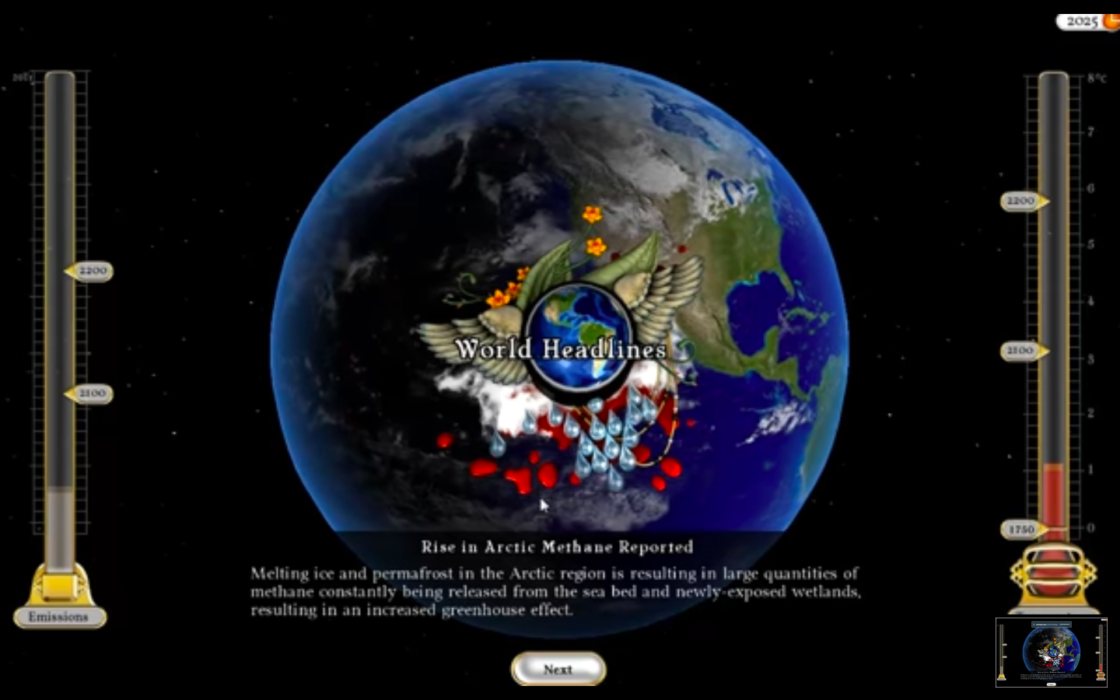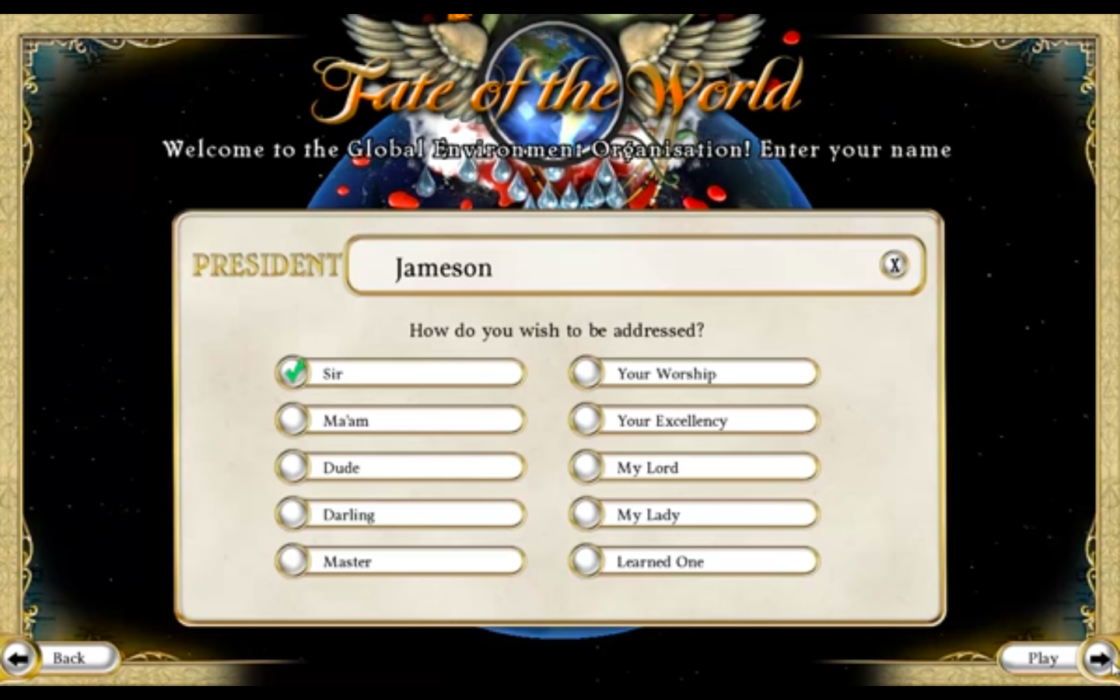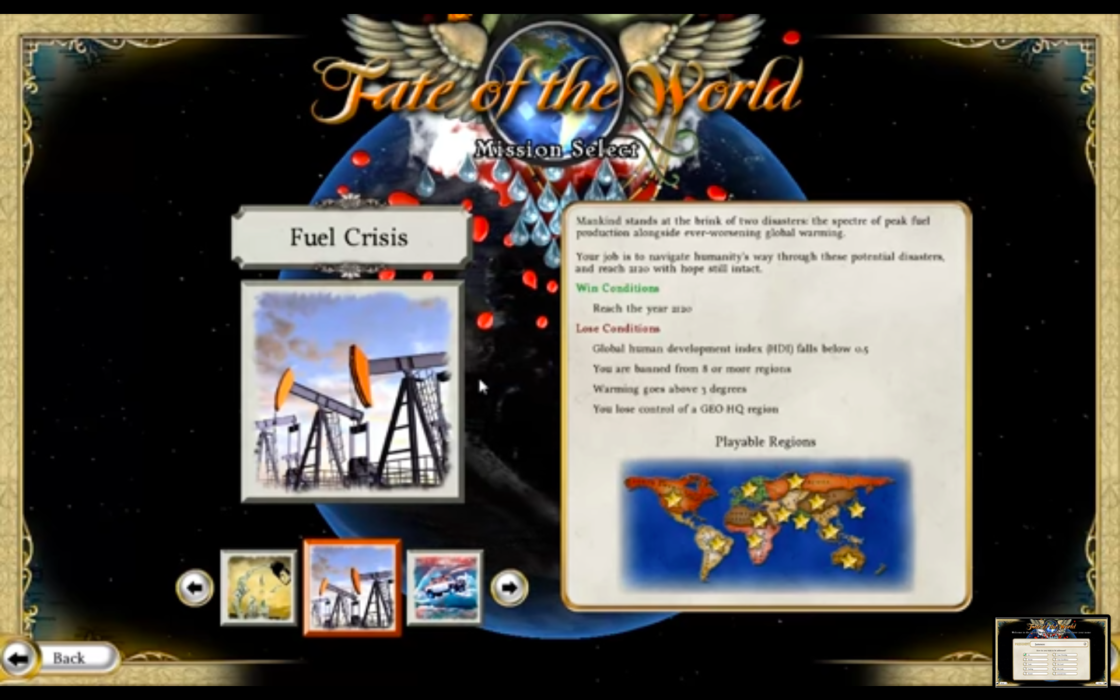Context:

Fate of the World is a global strategy game dedicated to solving the climate crisis, which was created by Red Redemption in 2010. The game is set ten years in the future, in the year 2020. All twelve regions of the world have opted to put their faith into a new governing body – the Global Environmental Organisation (GEO), and you – the player – are the President. You must take on a series of simulated real world policy missions. You win if you reach 2120 with your climate and societies still intact. You lose if the world warms more than 3 degrees centigrade, if the global human development index falls to an unacceptable level, or if regions lose faith in your leadership.
‘Mankind stands at the brink of two disasters: the spectre of peak fuel production alongside ever worsening global warming. Your job is to navigate humanity’s way through these potential disasters and reach 2120 with hope still intact.’ – The game’s ‘Peak Oil’ mission
Connections to eco-social sustainability:

The game features a background animation of the earth from space slowly revolving, indicating that days, months and years on earth are slowly passing. As President of GEO you can navigate to one of twelve geographic regions, and using a series of intricate menus you can make drastic policy changes with one click. Decarbonise energy systems in Europe? . Shift food systems in India? . Boost research funding in Brazil? . After each turn the game moves on 5 years, showing whether your actions have had utopian or apocalyptic consequences (or something in between).
The game’s strength is in combining multiple datasets about societal and environmental development into one model-like system. The game is eco-social in tying together sustainable development for the world’s poorest (you lose if they go hungry) with robust climate action. The game’s developers worked in collaboration with Oxford University climate scientist Myles Allen, to create a comprehensive and integrated overview of pathways to decarbonisation using official data sources, notably from the Intergovernmental Panel on Climate Change.
Transformative creative practice:

Climate change is often framed as a ‘wicked problem’ of immense complexity that is difficult for individual people to fully understand. By putting the Fate of the World into players’ hands, as Presidents of GEO, the game invites them to experience the complexity for themselves in a much more interactive way than reading policy documents or looking at individual datasets. Indeed, it may help players to question the lack of concerted political action around the urgent challenge of climate collapse. However, the game remains complex and best suited to players that have at least a basic knowledge of how earth systems are changing, and the dominant policy perspectives.
On learning and evaluation:
An increasingly large body of academic research explores the possibilities of playfulness, and game-like formats in helping people to imagine alternative futures. CreaTures Researcher Joost vervoort argues that deep seriousness and deep playfulness are not opposites, but rather deeply intertwined in our everyday lives. In this blog post, he asks:
‘Can we let go of the associations of playfulness as the opposite of seriousness, and therefore perhaps also frivolous, superficial and not valuable? Playfulness can loosen us from the constraints of society and its norms and values, and help us to re-perceive what is simply considered to be accepted reality. It can subvert and invert the ‘normal’, it can challenge existing power structures and ideologies and spark the imagination needed for new societal alternatives. With playfulness, after all, comes humor, the breaking and hacking of rules, and imaginative pretending…it also points to endless possibilities for imagining things otherwise.’
Learn more:
The game is available on the Steam platform.
Since 2019, developer Soothsayer Games have been exploring how to raise funds for an updated iteration of the game, Fate of the World online.
More blogs from Joost Vervoort on games and sustainability are available at Anticiplay.